|
|
|
Sort Order |
|
|
|
Items / Page
|
|
|
|
|
|
|
| Srl | Item |
| 1 |
ID:
133777
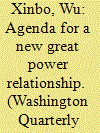

|
|
|
|
|
| Publication |
2014.
|
| Summary/Abstract |
Well begun is half done," Aristotle once said, meaning that beginning a project well makes it easier to do the rest. Yet, this may not be true of China-U.S. relations during Obama's presidency. Although the Obama administration secured a smooth transition from the George W. Bush years and attached high priority to relations with China during its first year in office, bilateral relations turned downward over the rest of Obama's first term, leaving a legacy of growing mutual suspicion and rising competition between the two countries, especially in the Asia-Pacific region. In spite of the November 2009 bilateral agreement to build a "positive, cooperative, and comprehensive relationship,"1 the two sides missed opportunities for more cooperation while mishandling and even misguiding bilateral ties on some points.
|
|
|
|
|
|
|
|
|
|
|
|
|
|
|
|
| 2 |
ID:
131147
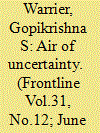

|
|
|
|
|
| Publication |
2014.
|
| Summary/Abstract |
Environment minister Prakash Javadekar will not have to worry about pressures from alliance partners. But one does not know how much space he is willing to carve out for himself and how much space the government is likely to give him.
|
|
|
|
|
|
|
|
|
|
|
|
|
|
|
|
| 3 |
ID:
171096
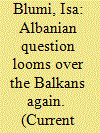

|
|
|
|
|
| Summary/Abstract |
Brussels and Washington had imposed a regime that subordinated the long-term goals of Albanians to the economic and political agendas of the Western powers.
|
|
|
|
|
|
|
|
|
|
|
|
|
|
|
|
| 4 |
ID:
129563
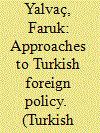

|
|
|
|
|
| Publication |
2014.
|
| Summary/Abstract |
This article analyses different approaches to Turkish foreign policy (TFP) from a critical realist perspective. It seeks to criticize positivist and post-positivist approaches to TFP, arguing for a non-reductionist, historical materialist approach based on the principles of critical realism. It argues that historical materialist approaches are missing both from the analysis of TFP and from the mainstream foreign-policy analysis in general. In emphasizing the importance of a historical materialist approach, the paper also underlines the importance of acknowledging the structural context of foreign policy-making as a complement to the agent-centric, micro-level analyses that dominate the mainstream TFP analysis. Finally, it advocates a research agenda that focuses on the development of a historical materialist approach to TFP.
|
|
|
|
|
|
|
|
|
|
|
|
|
|
|
|
| 5 |
ID:
131848
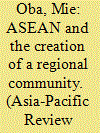

|
|
|
|
|
| Publication |
2014.
|
| Summary/Abstract |
After the ASEAN Concord II called for the building of an ASEAN Community in 2003, the creation of an ASEAN Community became a concrete part of the political agenda for the nations of Southeast Asia, and an ASEAN Community is scheduled to be created in 2015. However, it will all be for naught if the ASEAN Community that is established does not truly contribute to the stability and prosperity of the region. From this point of view, the article will attempt to evaluate the development of an ASEAN community concept and efforts to create it. To clarify the ideal of a true community, this article will take up Karl Deutsch's concept of "pluralistic security communities" and reconsider what a community requires. The article will state that the efforts to create an ASEAN Community should not be underestimated, and the blueprints for the creation of the ASEAN Community outline the formation of a true regional community. It will, however, conclude that in reality there exist factors within the ASEAN region that may shake the development of an ASEAN Community. It has to be said that the fostering of a sense of community at the level of ordinary people, as well as the creation of a community in which fundamental values and norms are shared, are distant propositions.
|
|
|
|
|
|
|
|
|
|
|
|
|
|
|
|
| 6 |
ID:
131993
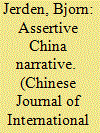

|
|
|
|
|
| Publication |
2014.
|
| Summary/Abstract |
Dissenting assaults on the conventional wisdom that China's foreign policy became more 'assertive' in 2009-2010 have intensified. In this article I develop this revisionist critique in three ways. First, to make the most valid and cumulative assessment of the accuracy of the 'assertive China narrative' to date, I conceptualise its key empirical claim as a case of the general phenomenon of 'foreign policy change'. Second, based on this framework, I present a range of new empirical evidence that, taken as a whole, strongly challenges the notion of a new Chinese assertiveness. Third, since academic China and Asia experts played a pivotal role in creating the narrative, I raise a comprehensive explanation of why a great many scholars so strikingly went along with the flawed idea.
|
|
|
|
|
|
|
|
|
|
|
|
|
|
|
|
| 7 |
ID:
131624
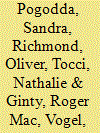

|
|
|
|
|
| Publication |
2014.
|
| Summary/Abstract |
European Union (EU) interventions in conflict countries tend to focus on governance reforms of political and economic frameworks instead of the geopolitical context or the underlying power asymmetries that fuel conflict. They follow a liberal pattern often associated with northern donors and the UN system more generally. The EU's approach diverges from prevalent governance paradigms mainly in its engagement with social, identity and socio-economic exclusion. This article examines the EU's 'peace-as-governance' model in Cyprus, Georgia, Palestine and Bosnia and Herzegovina. These cases indicate that a tense and contradictory strategic situation may arise from an insufficient redress of underlying conflict issues.
|
|
|
|
|
|
|
|
|
|
|
|
|
|
|
|
| 8 |
ID:
132333
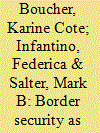

|
|
|
|
|
| Summary/Abstract |
The ambition of this special issue is to contribute to contemporary scholarly analyses of border security by bringing more focus onto a specific field of inquiry: the practices of the plurality of power-brokers involved in the securing of borders. Border security is addressed from the angle of the everyday practices of those who are appointed to carry it out; considering border security as practice is essential for shedding light on contemporary problematizations of security. Underscoring the methodological specificity of fieldwork research, we call for a better grounding of scholarship within the specific agencies intervening in bordering spaces in order to provide detailed analyses of the contextualized practices of security actors.
|
|
|
|
|
|
|
|
|
|
|
|
|
|
|
|
| 9 |
ID:
132334
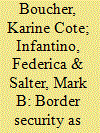

|
|
|
|
|
| Publication |
2014.
|
| Summary/Abstract |
The ambition of this special issue is to contribute to contemporary scholarly analyses of border security by bringing more focus onto a specific field of inquiry: the practices of the plurality of power-brokers involved in the securing of borders. Border security is addressed from the angle of the everyday practices of those who are appointed to carry it out; considering border security as practice is essential for shedding light on contemporary problematizations of security. Underscoring the methodological specificity of fieldwork research, we call for a better grounding of scholarship within the specific agencies intervening in bordering spaces in order to provide detailed analyses of the contextualized practices of security actors.
|
|
|
|
|
|
|
|
|
|
|
|
|
|
|
|
| 10 |
ID:
127592
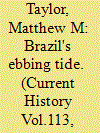

|
|
|
|
|
| Publication |
2014.
|
| Summary/Abstract |
Brazil is in a funk. The past year has brought violent protests, a new wave of corruption scandals, and wariness about the country's economic future. Former President Luiz Inácio Lula da Silva was known for his cheerful, tireless repetition of the message that "never before in the history of this country" had Brazil
accomplished so much. The contrast with his handpicked successor, Dilma Rousseff, was epitomized at the final match of the Confederations Cup, a major soccer tournament in June 2013, when Rousseff visibly stiffened as the crowd loudly booed her.
|
|
|
|
|
|
|
|
|
|
|
|
|
|
|
|
| 11 |
ID:
132307
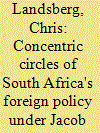

|
|
|
|
|
| Publication |
2014.
|
| Summary/Abstract |
South Africa's foreign policy could be viewed as a set of concentric circles which define the Republic's international priorities. In an attempt to bring coherence and predictability to them, the Zuma government has tried to learn from its predecessor, the Mbeki government (1999-2008), by putting emphasis on key international relations and concerns, and the idea was suggested that these different layers reinforced each other.
According to stated policy, pursuit of the national interests lay at the heart of the Republic's international strategies and came to be regarded as the new glue that holds it together, albeit it is four years into Zuma's government and the 'national interest' remains poorly developed and in need of expansion and implementation. A set of wider foreign policy concentric circles informs foreign policy, championed as 'Pursuing African Advancement and Enhanced Cooperation'. This agenda was to be pursued under a series of sub-goals or sub-categories, for our purposes concentric circles, namely (a) closing the gap between domestic and foreign policy; (b) continued prioritisation of the African continent-the Mbeki government called it African Agenda, or Africa first policy; (c) strengthening South-South relations; (d) strategic relations with strategic formations for the North; (e) participating in the global system of governance and (f) strengthening political and economic relations. While these six pillars were clearly developed on paper, and self-standing, how they all relate to the epicentre of the national interest and overlap one another is not so clear. More serious effort is needed on the part of government to close this lacuna, and the idea of coherence between them should not be assumed if there is to be consistency between them and the stated annulus of national interest.
|
|
|
|
|
|
|
|
|
|
|
|
|
|
|
|
| 12 |
ID:
122979
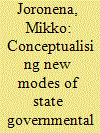

|
|
|
|
|
| Publication |
2013.
|
| Summary/Abstract |
This paper explores the ontological constitution of the neoliberal state. By enriching Michel Foucault's work on neoliberal governmentality with Heideggerian reading of the ontological conditions involved in the process, the paper argues for an understanding of neoliberalism as a mono-political process of 'enframing', through which things and human capabilities are revealed as an array of 'reserves' set available for the market rational utilisation. It is argued that the neoliberal state is not based on the ideological or discursive turn in political practices, but on the extending drive, through which the real itself, including the ethical constitution of human conducts, natural entities, and life (with its possibilities), is ontologically positioned to serve the interests of profit-making. The paper concludes by showing how the neoliberal state and the economisation of everyday life are fundamentally based on the ontological violence of concealing the openness of being, and thus, the possibility for ontological politics.
|
|
|
|
|
|
|
|
|
|
|
|
|
|
|
|
| 13 |
ID:
131135
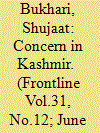

|
|
|
|
|
| Publication |
2014.
|
| Summary/Abstract |
The controversy over Article 370 has affected the psyche of the average Kashmiri and give rise to the fear that certain important right that the people of the state enjoy are going to be snatched away.
|
|
|
|
|
|
|
|
|
|
|
|
|
|
|
|
| 14 |
ID:
129540
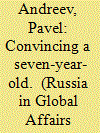

|
|
|
|
|
| Publication |
2014.
|
| Summary/Abstract |
Russia's ideology should be based on the will to defend its traditional values, sovereignty and justice rather than the negation of all other ideas. A positive agenda is more likely to be attractive and influential than a strategy of repulsion.
Soft power has emerged as a popular topic of discussion in the Russian political and expert communities in recent months. There is much talk about the tools of soft power - the Foreign Ministry, the Federal Agency for the Commonwealth of Independent States, Compatriots Abroad and International Humanitarian Cooperation (Rossotrudnichestvo), the media, and various foundations and institutions. Not to be overlooked, however, is the importance of narrative, that is, the conceptual way we talk about the country's current state, its values and geopolitical orientation. Narrative is the fabric that puts together the diverse soft power institutions which collectively form a single information "fist."
|
|
|
|
|
|
|
|
|
|
|
|
|
|
|
|
| 15 |
ID:
131511
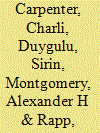

|
|
|
|
|
| Publication |
2014.
|
| Summary/Abstract |
Through a series of focus groups with human security practitioners, we examined how powerful organizations at the center of advocacy networks select issues for attention. Participants emphasized five sets of factors: entrepreneur attributes, adopter attributes, the broader political context, issue attributes, and intranetwork relations. However, the last two were much more consistently invoked by practitioners in their evaluations of specific candidate issues. Scholars of global agenda setting should pay particular attention to how intranetwork relations structure gatekeeper preferences within transnational advocacy spaces because these help constitute perceptions of issues' and actors' attributes in networks.
|
|
|
|
|
|
|
|
|
|
|
|
|
|
|
|
| 16 |
ID:
131892
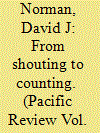

|
|
|
|
|
| Publication |
2014.
|
| Summary/Abstract |
This article explores the emergence of new spaces for civil society organisations (CSOs) as a result of an increasing interest by international donors in multi-stakeholder approaches to good governance under the 'new policy agenda'. Drawing upon a contemporary case study of civil society in Cambodia, it argues that CSOs have been encouraged to perform two key roles on a national level: professional service delivery agents and democratic watchdogs. Both roles are seen by donors as integral to supporting an accountable and professional model of the Cambodian state while drawing upon valuable private sector lessons in a synergetic model of governance. The result is the construction of particular neoliberal spaces for CSOs operating as technical implementation mechanisms in response to externally driven donor pressures. Furthermore, under this new framework of governance, CSOs face pressure to undergo internal transformation akin to new public management reform; embracing economistic and administrative modes of coordination as core values of civil society participation.
|
|
|
|
|
|
|
|
|
|
|
|
|
|
|
|
| 17 |
ID:
131951
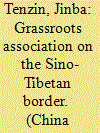

|
|
|
|
|
| Publication |
2014.
|
| Summary/Abstract |
This article investigates the role of the Moluo Tourism Association in Suopo township, Danba county, Sichuan. It examines its organization, internal structure and objectives, and explores the concerns of Tibetan elites and villagers and their strategies for advancing their political and other goals in an officially sanctioned framework. The research shows that the association resembles a "state-led civil society" as its membership and agendas exhibit the strong will of the local state; nevertheless, it still manages to carve a space for expressing negative opinions towards the local authorities, pursuing the "Eastern Queendom" cause and following its own agendas. The dynamic and nuanced interactions between the association and township show that state-society relations in China are situated in a complex and convoluted landscape which has not yet been fully explored in the China field. Furthermore, the article brings to light the divergent interests and positions of the association members as well as the heterogeneity of Suopo society proper. It concludes with a brief discussion of the prospects for an enhanced engagement of ethnic research with broader China studies.
|
|
|
|
|
|
|
|
|
|
|
|
|
|
|
|
| 18 |
ID:
131637
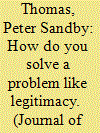

|
|
|
|
|
| Publication |
2014.
|
| Summary/Abstract |
Previously in this journal, Gunter Schubert's article, entitled 'One-party rule and the question of legitimacy in contemporary China', called for the setting up of a new research agenda to analyze the legitimacy of the Chinese Communist Party (CCP). While making a valuable contribution to the study of the CCP's legitimacy, Schubert's emphasis on the empirical measurement of this concept gives rise to a number of conceptual and theoretical issues. As a consequence, this article seeks to contribute to the research agenda by addressing these issues. In so doing, it suggests that a shift away from a narrow empirically-measured focus on legitimacy towards a broader conceptually-driven concern with legitimation would allow for a more inclusive agenda within the China studies community and lead to a more complete understanding of why the CCP remains in power.
|
|
|
|
|
|
|
|
|
|
|
|
|
|
|
|
| 19 |
ID:
131137
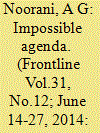

|
|
|
|
|
| Publication |
2014.
|
| Summary/Abstract |
The BJP's long running pledged for the abrogation of Article 370, for a Ram temple in Ayodhya, and for a uniform civil code are constitutionally impossible to fulfil politically divisive and morally outrageous.
|
|
|
|
|
|
|
|
|
|
|
|
|
|
|
|
| 20 |
ID:
130643


|
|
|
|
|
| Publication |
2013.
|
| Summary/Abstract |
A rising Africa has caught the attention of the world not merely because of its vast natural resources but also because it is the economically fastest growing continent. The article argues that, as Africa gains prominence, the roles of China and India have come into focus. New Delhi's current policy is quite different from that it pursued in the post-independence era, which was focussed on the limited political agenda of anti-colonialism. Even as its interests in the Indian Ocean rapidly grow, its great power ambitions are increasing backed by a burgeoning economy. This has necessitated a new a new policy of engagement that is expansive and multifaceted, encompassing political, economic and strategic dimensions. India maintains that its robust economic relationship is part of South-South cooperation and hence mutually beneficial, for it is aimed at capability and institution building. While economic and political aspects continue to dominate the academic discourse, the Indian Ocean is beginning to become a significant factor in India's Africa policy, even as this ocean acquires enormous geostrategic and economic
|
|
|
|
|
|
|
|
|
|
|
|
|
|
|
|
|
|
|
|
|